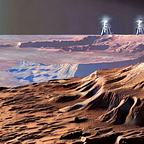Artificial Intelligence and the Human Microbiome: Unlocking the Secrets of Our Second Brain
Did you know that trillions of microorganisms live inside your body, playing a vital role in your overall health and well-being? This fascinating world of bacteria, fungi, viruses, and other tiny life forms is collectively known as the human microbiome. Scientists are just beginning to understand the complex interactions between these microorganisms and our bodies, and artificial intelligence (AI) is proving to be a powerful tool in unlocking the secrets of this “second brain.” In this article, we’ll explore the exciting intersection of AI and the human microbiome and what it could mean for the future of health and medicine.
What is the Human Microbiome?
The human microbiome is a vast ecosystem of microorganisms that reside in and on our bodies, primarily in the gut. These microscopic life forms play essential roles in digestion, immune function, and even mental health. In recent years, researchers have discovered that an imbalanced or disrupted microbiome can contribute to various health issues, including obesity, diabetes, and autoimmune diseases. This has led to a growing interest in understanding and manipulating the human microbiome to improve health outcomes.
How AI is Helping to Decode the Human Microbiome
Studying the human microbiome is no easy task. The sheer number of microorganisms and the complexity of their interactions make it difficult to analyze and understand. This is where artificial intelligence comes in. By utilizing advanced algorithms and machine learning techniques, AI can help researchers process and analyze the vast amounts of data generated by studies of the human microbiome. Here are some ways AI is revolutionizing our understanding of this complex ecosystem:
Identifying Patterns and Relationships
AI can quickly analyze large datasets, searching for patterns and relationships that might be difficult or impossible for human researchers to detect. This can help scientists identify correlations between the composition of the human microbiome and various health conditions, leading to new insights into disease prevention and treatment.
Predicting Microbiome Changes
Artificial intelligence can also be used to predict how the human microbiome will respond to changes in diet, medication, or other interventions. This can help researchers develop targeted therapies to manipulate the microbiome and improve health outcomes.
Personalized Medicine and Nutrition
By analyzing an individual’s unique microbiome profile, AI can help develop personalized medicine and nutrition plans. This could lead to more effective treatments and interventions tailored to an individual’s specific needs, ultimately improving overall health and well-being.
The Potential Benefits of AI and the Human Microbiome
As AI continues to unlock the secrets of the human microbiome, the potential benefits for health and medicine are enormous. Here are just a few examples of how AI-driven microbiome research could impact our lives:
Improved Disease Prevention and Treatment
A deeper understanding of the human microbiome and its role in health and disease could lead to new strategies for preventing and treating a wide range of conditions. For example, AI-driven microbiome research could help identify bacterial strains that promote healthy immune function, leading to new probiotic therapies for autoimmune diseases.
Enhanced Mental Health
The human microbiome has been linked to mental health, with some researchers referring to it as the “second brain.” By understanding the connections between the microbiome and the brain, AI could help develop new treatments for conditions such as depression, anxiety, and even autism.
Optimized Nutrition
AI-driven microbiome research could also lead to personalized nutrition plans that optimize an individual’s gut health. By understanding how different foods and nutrients affect the microbiome, AI could help create customized diets that promote optimal health and well-being.
Anti-Aging and Longevity
The human microbiome has been linked to the aging process, with some studies suggesting that a healthier gut can lead to a longer life. AI-driven research in this area could help identify interventions and lifestyle changes that promote a healthy microbiome and, ultimately, increase longevity.
Improved Athletic Performance
Emerging research suggests that the human microbiome may also play a role in athletic performance. AI-driven analysis of the microbiome could help identify the optimal balance of microorganisms to support peak performance and recovery, potentially revolutionizing how athletes train and compete.
The Future of AI and the Human Microbiome
As artificial intelligence continues to advance and become more integrated into the study of the human microbiome, we can expect to see even more groundbreaking discoveries in this fascinating area of research. With the potential to revolutionize how we approach health and medicine, the combination of AI and the human microbiome promises to unlock new possibilities for improving our lives.
From personalized medicine and nutrition to mental health and longevity, AI-driven research into the human microbiome is poised to transform our understanding of health and well-being. As we continue to unlock the secrets of our “second brain,” the future looks brighter than ever for harnessing the power of these tiny life forms to improve our lives.
Like the article? Don`t forget to follow us on Medium! Also interesting content on our Instagram, Facebook, and Twitter!
